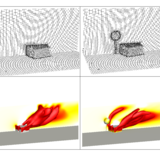News Archive
Tuesday, August 20 2019
-
What’s driving more women to drink?
More women are drinking alcohol and an Iowa State University research team is working to understand why. Not only is the gap shrinking between men and women who drink, but ISU researchers found variations in the amount and frequency women drink based on age, race, education, marital status and other factors.
-
Comparing your house to your neighbors’ can lead to dissatisfaction
Satisfaction with your home can depend on its size compared to your neighbors’ homes, according to new Iowa State University research. Daniel Kuhlmann, assistant professor of community and regional planning, found that people are more likely to be dissatisfied with their house if it is smaller than their neighbors’.
-
Physicists use light flashes to discover, control new quantum states of matter
Jigang Wang and the members of his research group are developing new tools and techniques to access new states of matter hidden within superconducting and other complex materials. Harnessing these exotic states and their unique properties could lead to better computing, communicating and data storing technologies. Wang's research is supported by the U.S. Army Research Office.
-
New link between endocannabinoids and exercise may help in treatment of depression
Researchers know exercise improves mood for people with depression, but there are still questions about exactly how it makes people feel better. The answers may be found in the endocannabinoid system. A new study found a significant boost in endocannabinoids and improvements in mood following prescribed moderate-intensity exercise.
-
New study could reset how scientists view sex determination in painted turtle populations
A study that looks at how temperature influences the development of painted turtles may lead biologists to rethink the theoretical frameworks they use when analyzing the topic. The study, led by an Iowa State scientist, found wide variation within local populations, suggesting temperature sensitivity of embryonic development can vary significantly from one turtle nest to another within a single population.
-
Species aren’t adapting fast enough to cope with climate change, according to new study
Many species are adapting to climate change, but those adaptations aren’t occurring fast enough to guarantee their long-term survival, according to a recent study that analyzed 10,000 published scientific papers. An Iowa State University biologist contributed to the international research team.
-
Researchers develop novel process to study how trees affect building temperatures, air flow in extreme heat
Researchers at Iowa State University have developed a model to test how shading and air flow can improve indoor temperatures during the sweltering heat of Midwest summers.
-
Report seeks to recognize meaning of Mount Rushmore for Native people
Mount Rushmore is a symbol of freedom for many Americans, but the monument has a more complicated meaning for Native people. Iowa State's Christina Gish Hill is part of a research team working with the National Park Service to document the significance of the Black Hills for Lakota, Cheyenne and Arapaho people in relationship to Mount Rushmore.
-
Engineers use heat-free tech for flexible electronics; print metal traces on flowers, gelatin
Researchers led by Iowa State's Martin Thuo are using liquid-metal particles to print electronic lines and traces on rose petals, leaves, paper, gelatin -- on all kinds of materials. The technology creates flexible electronics that could have many applications such as monitoring crops, tracking a building's structural integrity or collecting biological data.
-
Family experience influences diabetes risk, management for African Americans
African American families not only share a higher risk for Type 2 diabetes, but many myths and misconceptions about the disease are often passed on from one generation to the next. To understand how family experiences influence risk and management of the disease, a team of Iowa State University researchers interviewed parents and adult children of 20 African American families with strong histories of Type 2 diabetes.









